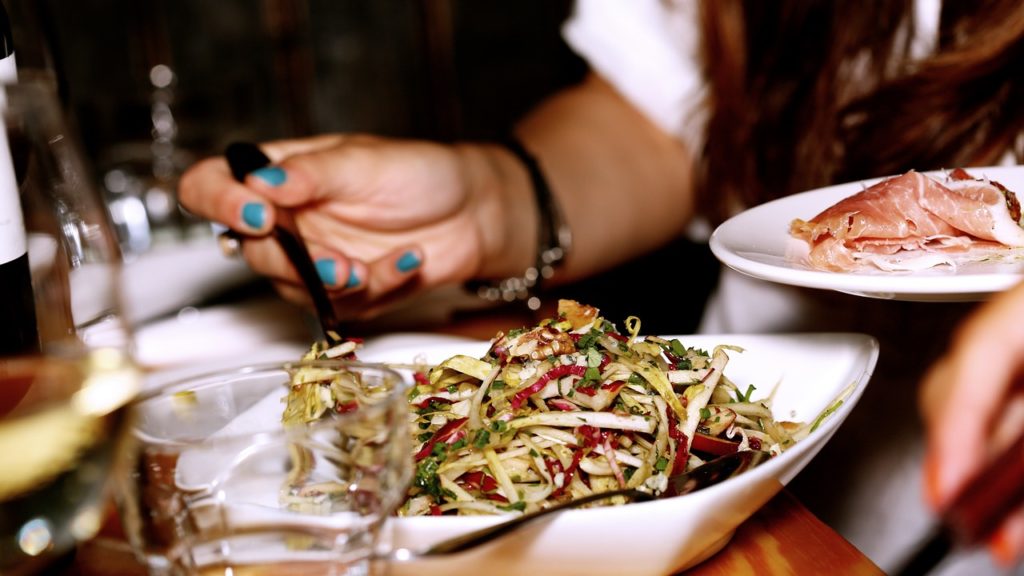- Calls to this hotline are currently being directed to Within Health, Fay or Eating Disorder Solutions
- Representatives are standing by 24/7 to help answer your questions
- All calls are confidential and HIPAA compliant
- There is no obligation or cost to call
- Eating Disorder Hope does not receive any commissions or fees dependent upon which provider you select
- Additional treatment providers are located on our directory or samhsa.gov
Hoarding Food and Food Rituals: What Do These Behaviors Mean?

Contributor: Crystal Karges, MS, RDN, IBCLC, Director of Content and Social Media at Eating Disorder Hope/Addiction Hope
Cutting food into very small pieces. Separating foods on the plate. Biting foods a certain number of times. Excessively chewing before finally swallowing.
These are all examples of food rituals that are often exemplified by an individual who has an eating disorder. In some instances, food rituals are quite subtle to the outsider, while in other situations, food rituals are much more apparent.
Whatever the scenario may be, food rituals are typically associated with the disease itself and representative of a chaotic relationship with food.
Understanding Food Rituals
For a person who may be struggling with an eating disorder, as well as their loved ones, food rituals can be a warning sign that a greater issue is at bay. While not everyone who exhibits food rituals will also have an eating disorder, engaging in food rituals is often an attempt to gain control of an overwhelming situation.
Mealtime is often provokes increased anxiety for the individual struggling with an eating disorder, and ritualistic eating can be an attempt to cope with the stress that is experienced around food and body.
Challenging food rituals that have become an engrained way of eating is important for the recovery process to progress. This can be done slowly, working on releasing one food ritual at a time. As a person learns how to integrate and apply appropriate copy mechanisms in the face of anxiety, fear, stress, etc., food rituals will become less necessary.
Other Possible Connections
Food rituals can also be part of other concerning disorders, such as Obsessive Compulsive Disorder (OCD). A person dealing with OCD may engage in repetitive behaviors, such as counting number of bites, cutting food into certain ways, and more. These ritualistic behaviors may evolve as a way of establishing a sense of comfort in an unknown or stressful situation.
Food ritualistic behaviors should not be overlooked, as they can represent a more complex issue that needs to be professionally addressed. Connecting with an eating disorder specialist can help discern any underlying issues that may potentially be present.
Community Discussion – Share your thoughts here!
What do you think is the importance of addressing food ritual behaviors?
 About the Author: Crystal is a Masters-level Registered Dietitian Nutritionist (RDN) with a specialty focus in eating disorders, maternal/child health and wellness, and intuitive eating. Combining clinical experience with a love of social media and writing, Crystal serves as the Special Projects Coordinator for Eating Disorder Hope/Addiction Hope, where her passion to help others find recovery and healing is integrated into each part of her work.
About the Author: Crystal is a Masters-level Registered Dietitian Nutritionist (RDN) with a specialty focus in eating disorders, maternal/child health and wellness, and intuitive eating. Combining clinical experience with a love of social media and writing, Crystal serves as the Special Projects Coordinator for Eating Disorder Hope/Addiction Hope, where her passion to help others find recovery and healing is integrated into each part of her work.
As a Certified Intuitive Eating Counselor, Crystal has dedicated her career to helping others establish a healthy relationship with food and body through her work with EDH/AH and nutrition private practice.
The opinions and views of our guest contributors are shared to provide a broad perspective of eating disorders. These are not necessarily the views of Eating Disorder Hope, but an effort to offer discussion of various issues by different concerned individuals.
We at Eating Disorder Hope understand that eating disorders result from a combination of environmental and genetic factors. If you or a loved one are suffering from an eating disorder, please know that there is hope for you, and seek immediate professional help.
Last Updated & Reviewed By: Jacquelyn Ekern, MS, LPC on July 17, 2016
Published on EatingDisorderHope.com

The EatingDisorderHope.com editorial team comprises experienced writers, editors, and medical reviewers specializing in eating disorders, treatment, and mental and behavioral health.

